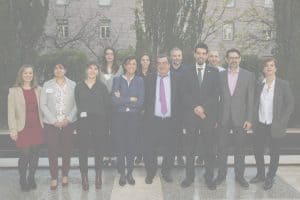The UK’s research and innovation (R&I) sector, as with many others, strongly relies on migrants to thrive. This is supported by the fact that 28% of the academic workforce at universities is non-British, from which 16% of them (1), 20% in the case of the Russell Group (2), come from European Union (EU) countries. Around 129,000 Spanish nationals live in the UK (3), among which 3,500 are scientists working in universities (4). This figure rises to 5,000 when considering Spanish scientists working in other R&I public institutions, companies and administration (5). With more than 600 members, the Society of Spanish Researchers in the United Kingdom (SRUK) represents a large proportion of Spanish nationals working in R&I in the UK. After the referendum in late 2016, SRUK launched a survey to collect our members’ views and concerns arising from the result. A total of 202 members answered the 2016 survey and the main findings are:
2016 SURVEY RESULTS
- Over 30% of SRUK members decided to change their future plans following the referendum result
- 43% of SRUK members would leave the UK if no certainty and security is urgently offered to EU nationals already in the UK
- Over 70% of SRUK members either do not qualify to request the Permanent Residence card, or are not aware of the process to request it
- If they were to leave, over 30% would move back to Spain, 60% would move to another EU Member State and 10% would go outside Europe
The results of the 2016 survey are available here.
These results reflect the uncertainty that our members are facing post-referendum. Many of us came to the UK attracted by its world-leading, collaborative and supportive R&I sector. Research and innovation, as well as a scientist ́s potential, thrive on clear long-term professional and personal frameworks. Times Higher Education World University Rankings places the UK as the best nation for internationalization (6), reflecting the high proportion of foreign staff, students and ongoing international collaborations. This long-standing international collaboration tradition has a positive impact on the British economy, as well as on the exchange of revolutionary ideas which come with highly skilled individuals – something that Spanish researchers and many other European scientists have been part of.
Promoting collaboration on R&I between Spain and the UK is one of SRUK foundational aims. Throughout Brexit negotiations we will continue strengthening the collaborations between both countries. We therefore would like to encourage the UK government to adopt specific measures to maintain the already prosperous British R&I sector.
These measures would secure a Brexit that works for all:
- Swiftly safeguarding and reassuring the rights and status of European scientists working in the UK
- Working together with universities, research centres, charities and societies, including SRUK, to develop initiatives to secure the British R&I sector
- Developing dedicated programs to facilitate the mobility of researchers
- Developing agreements to secure the same level of access to European R&I funding and seekto increase the fraction of national GDP devoted to R&I to 3% in line with leading World economies
References
1) Royal Society – The role of the EU in international research collaboration and researcher mobility (accessed on 07.02.2017).
2) Russell Group – Statement on the EU Referendum Result, 24 June 2016 (accessed on 07.02.2017).
3) Migration Watch UK – The British in Europe – and Vice Versa (accessed on 07.02.2017).
4) High Education Statistics Agency (HESA) – Staff in Higher Education 2014/2015
5) Department of Work and Pensions, Freedom of Information request 455 – An estimation of the number of Spanish people working in scientific-related jobs in the UK.
6) Times Higher Education – The world’s most international universities 2016 (accessed on 07.02.2017)






